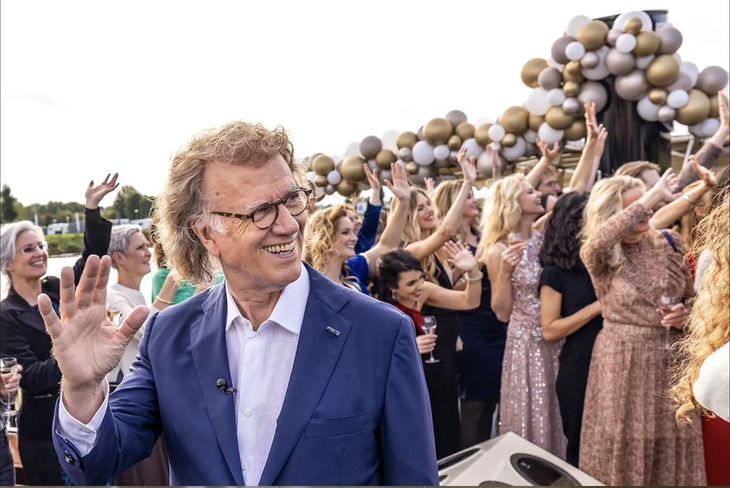
Scene from André Rieu's film 75th Birthday Celebration: The Dream Continues - Photo: ImDb
André Rieu's documentary about his 75th birthday is also quite frivolous. (After all, what other violinist makes an entire film to celebrate their birthday?).
"He's the kind of person who wakes up every morning remembering all his dreams and makes them come true," a member of the Johann Strauss Orchestra said of André Rieu in the documentary celebrating the 75th birthday of the most beloved violinist and conductor today, André Rieu's 75th Birthday Celebration: The Dream Continues.
Everyone who has ever worked with André Rieu has vivid memories of him. The common thread in those memories is: Rieu was eccentric, very spontaneous, but working with him was a joy.
One of Rieu's "classic" acts at a Vienna concert: he had the brass musicians in the orchestra drink beer and eat dinner while they played – they clinked glasses before their turn to perform, and by the time it was their turn, they were already a little tipsy.
It all started with a party hosted by Rieu and the musicians of Johann Strauss's orchestra on a yacht.
Here, he recalled the times he was received by the King of Bahrain and the cannon salute. Then, the host began to interview Rieu and asked him to choose his favorite pieces from nearly 40 years of taking the orchestra around the world.
Without needing a private, nostalgic space, amidst a crowd of colleagues, Rieu recalled the theatrical feats he had once created: assembling a choir of elderly men to sing "When I'm 64";
There were collaborations with Chinese opera singers, Argentinian bandoneons, and ice skaters; and even a golden horse-drawn carriage carrying the artists around the stage.
And there were also more modest performances, such as when he returned to his hometown of Maastricht, and before playing music, he recounted his childhood of being forced to study music, and then introduced his younger brother who was also playing in the Johann Strauss Orchestra.
The most fascinating aspect of watching André Rieu's performances often lies not in the act itself, but in the audience's reaction. They dance along to the performance. They laugh along. They cry along with it.
The faces of the audience seem to be a second stage in Rieu's concerts, a stage he subtly controls—a stage of emotions: surprise, astonishment, joy, emotion… He is not only the conductor of the stage orchestra, but also the conductor of the emotional symphony among thousands of his audience. That too is a remarkable feat.
On average, André Rieu performs for nearly a million people each year. This means he has many admirers. However, there are also many who can't stand him. They find his performances too flamboyant, too cheesy, too flashy. It's a performance, not music!
But wasn't the famous composer Johann Strauss II, the classical composer after whom Rieu named his orchestra, also a great entertainer during his lifetime?
The centuries-long gap might lead us to believe that classical music must always be serious and formal, but the truth is that the waltzes and operettas of the Strauss father and son were once loved for their entertainment value and abundant energy.
Whether it's serious or not doesn't matter. In the film, Rieu mentions a memory from a tour in Bogotá, on a Friday the 13th, when the stage experienced a technical malfunction. The problem remained unresolved for over half an hour.
Over 14,000 spectators packed the stadium without showing any signs of irritation. If necessary, they would readily stay until the next day, just to see the rest of the performance by Johann Strauss and his orchestra. And then, in that atmosphere, an 8-year-old boy in the audience suddenly picked up his small flute and played a piece of music.
The boy's entire family bought their tickets six months in advance using a credit card, at a price that was not cheap for a middle-class South American family, just to be here and see their idol.
How many violinists could inspire an 8-year-old boy, still learning to play the flute, to stand up and play a piece he's barely learning? If that's not considered a feat, then what is?
Source: https://tuoitre.vn/ky-cong-cua-andre-rieu-20250518090250751.htm

































































































Comment (0)